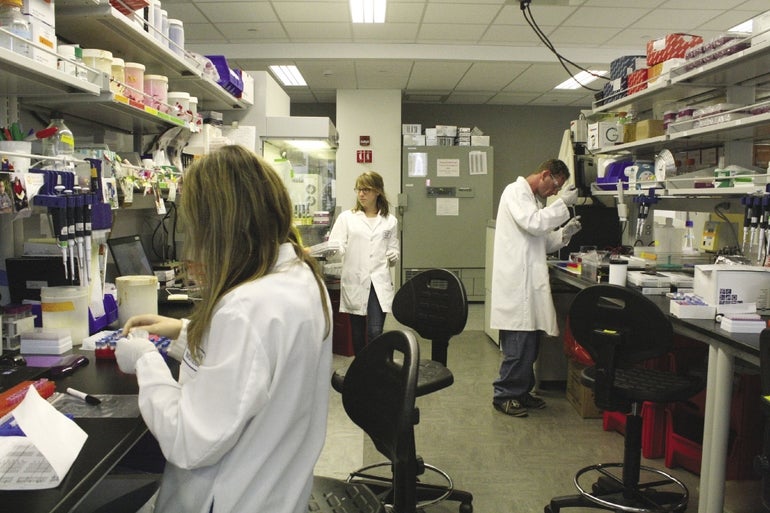The rate of spending on research and development in Massachusetts outpaced that of its peer states with vibrant technology sectors as the innovation economy grew by more than $25 billion from 2009 to 2014, driving $209.8 billion in economic output in 2014, according to an annual report released Tuesday.
The Index of the Massachusetts Innovation Economy, published by the Innovation Institute at the Massachusetts Technology Collective, found that the fields making up the innovation economy experienced higher job growth than the overall economy from 2014 to 2015.
Pat Larkin, the institute’s director, said that the achievement of Massachusetts’ innovation economy is driven by a research enterprise that is “second-to-none across the country.”
“This is the differentiator for us,” Larkin said. “This is where we seed growth into our key sectors, whether it is health care, biotech, life sciences, software. This is what distinguishes us from other regions.”
The report compares Massachusetts to nine other states with strong technology sectors, including California, New York, Connecticut, New Jersey, Texas, Ohio, Minnesota and Pennsylvania. Of the 10 “leading technology states,” the Bay State’s 5.59 percent as of 2012 is the highest rate of research and development spending as a percent of gross domestic product.
The institute counts 11 technology and knowledge-driven fields, including advanced materials, biopharmaceuticals and medical devices, postsecondary education, defense manufacturing, computer and communications hardware, business services and health care delivery, as parts of the innovation economy.
Job growth in the Massachusetts innovation economy hit 2 percent from the first quarter of 2014 to the first quarter of 2015, compared to 1.7 percent overall employment growth in the state. Of the 10 leading technology states the report examines, only Massachusetts and New York experienced greater innovation job growth than growth in total employment.
Larkin said that Massachusetts is buoyed by a “friendly environment for innovation.”
“It’s our ecosystem,” he said. “I think that it goes to the size of our state. It’s a state where people can get to know each other and get to meet each other and share ideas, and geographically it’s very dense, and that leads to — I call it ideation. The movement of ideas is really the input to a vibrant ecosystem.”
According to the report, venture capital investment in Massachusetts increased 74 percent from 2009 to 2014, and Massachusetts is home to the highest percentage of adults with a bachelor’s degree or higher (46.1 percent) compared to the average of leading technology states (35.5 percent) and the rest of the U.S. (33.1 percent).
Massachusetts, California and Texas are the only leading technology states to not experience low or negative net migration as a percentage of their population, the report said. The 2014 migration trends in Massachusetts still amounted to a “distinct slowdown” in net migration, though it was still positive.
In 2014, international migration stayed steady at 37,285 people coming into the state from other countries, the report found. Domestic migration of residents relocating to and from other states worsened, from a loss of 2,175 people in 2013 to a loss of 16,354 people in 2014.
“I think the migration trends are ones that we would want to watch closely and try to understand why that domestic migration has occurred and is there anything else we can do to stabilize that,” Larkin said.
Based on interviews with executives from co-working spaces, incubators and accelerators, the report cites “significant demand” for collaborative workspaces outside of the Boston area, but said such facilities have trouble attracting funding. Massachusetts also saw a 26 percent decline in Small Business Innovation Research (SBIR) and Small Business Technology Transfer (STTR) awards from 2010 to 2014, compared to an 18 percent decline nationally.

